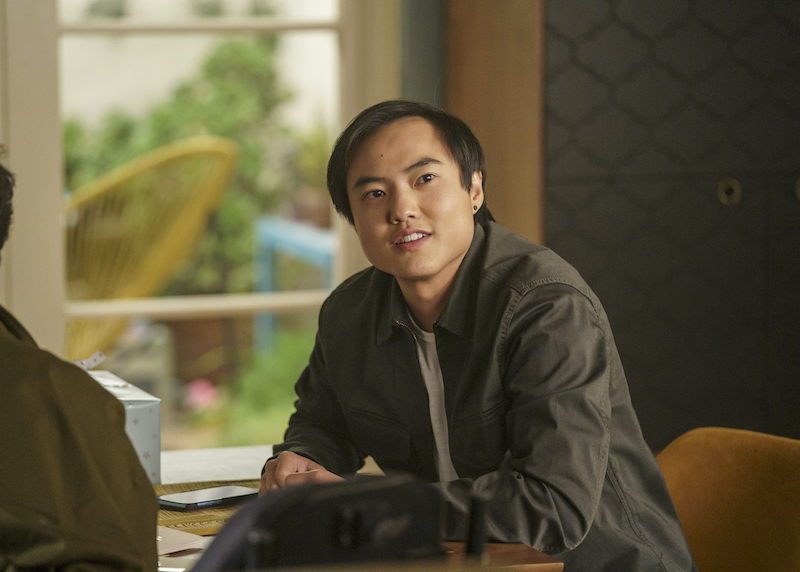
Fall leaves and changing seasons тАФ thatтАЩs what Leo Sheng of ShowtimeтАЩs The L Word: Generation Q, misses most about Michigan. Now based in Los Angeles, the Ypsilanti-raised actor will reprise his role as trans-masculine sociology professor Micah Lee in the showтАЩs second season, which premieres on Aug. 8.
We sat down with him to talk about what to expect this season, filming during the pandemic, and the causes heтАЩs passionate about.╠¤Some spoilers from season one are ahead.
║┌┴╧═Ї Detroit: In the season two trailer, Micah is shown confessing that he slept with a woman. Will Micah explore his identity a bit more?╠¤
Leo Sheng: I love the way the trailer left that тАФ thereтАЩs no explanation. IтАЩm really grateful we get to see Micah join that journey; or re-embark on that journey, because he started that journey in his life already. I think this is just another path that he hasnтАЩt really let himself experience before.
Season one ended with the revelation that MicahтАЩs love interest, Jos├й, had secretly been married all along. Are we going to get some resolution to this storyline in season two?╠¤
I think we get answers. IтАЩm still trying to figure out how I feel тАФ IтАЩm very conflicted; MicahтАЩs happiness is so important to me. I think that what we get to see isтАжwhat does happiness mean in a relationship? What does it mean to give yourself fully, and what does that mean if that is or isnтАЩt reciprocated, and what does that mean for MicahтАЩs sense of vulnerability and trust?
There was some backlash over how the original L Word portrayed its only trans character, Max. He was written into this tragic storyline of black-market testosterone and manic behavior, and a lot of people felt it was an overly stereotypical depiction. How do you feel about the way this new version reflects the trans experience?╠¤
One thing that I think has really shifted since the original [L Word] is understanding that there is no singular trans experience. Yes, Max is fictional, but that doesnтАЩt mean that these experiences he had werenтАЩt experienced by other people. I think thatтАЩs really a challenge тАФ how do we imbue characters with authenticity, knowing itтАЩs not going to speak to every single person of that identity? I think the language we use, the ideas we have come to better understand in a mainstream way, have really changed a lot. So, IтАЩm grateful that we get to explore more of what it means for Micah to be trans in 2021.
What was it like filming the second season during the pandemic?
There are moments of dystopian-ness. You look around and everyoneтАЩs masked, everyone has a shield on, which is good and important, and it needs to happen тАФ itтАЩs just a little jarring. My respect and admiration for everyone involved shot up. Everyone was so committed to not only filming and doing it on schedule but to keeping each other safe. People have kids тАФ my roommates have a baby тАФ and everyone has different levels of safety that they need to adhere to. I hope as audience members we have a bigger appreciation for what shows and crews had to navigate.
The pandemic has exacerbated anti-Asian racism in the U.S. Did this impact how you approached your role for season two?╠¤
Micah is a Chinese-American guy, so IтАЩm playing somebody who is very much like myself and likely feels things the way I feel things. There was a day I was on set, and it was the morning after the shooting in Atlanta. That was really challenging. I donтАЩt know how much it affected my acting, but it affected the way I interacted on set. ItтАЩs a symptom of the broader rise inтАжracism, oppression, and marginalization that has increased over the last year and a half as well. It didnтАЩt necessarily impact Micah, but I carried it with me.
Your acting career initially launched thanks to you candidly sharing your transition experience on Instagram. What does it mean to you to share your experiences with an ever-growing audience?╠¤
ItтАЩs a massive privilege, itтАЩs an honor, and itтАЩs something that I think aboutтАжall the time. As my platformтАЩs grown, I just feel an increasing sense of responsibility. I know I donтАЩt speak for everybody, and I donтАЩt want toтАжI want to speak about my own experiences. I hope people can learn from those, and on a very basic level, learn trans people are human тАФ because I think unfortunately in a lot of parts of the world and the country, thatтАЩs still not fully agreed upon.
YouтАЩve been particularly vocal recently about transgender participation in youth sports. Why is this issue so important to you?
For me, a big part of it is trying to make the distinction that itтАЩs often trans women and trans girls [who are targeted], and that kind of shows that more often than not, anti-trans legislation and arguments are actually trans-misogynistic. ItтАЩs important to show trans kids are just trying to live their lives. We all are. If weтАЩre not hurting anybody or harming anybody, why should that be taken away, especially from a 10-year-old?
When we last spoke with you in 2019, you mentioned deferring your Master of Social Work program at the University of Michigan. Do you have any plans to complete your graduate degree?
IтАЩve never ruled it out. ItтАЩs more of a matter of, can I finish with the credits I already have? And if I wanted to keep those credits, IтАЩd have to do it in the next year or two, and that just doesnтАЩt seem possible right now. But itтАЩs never off the table.
|
| ╠¤ |
|








